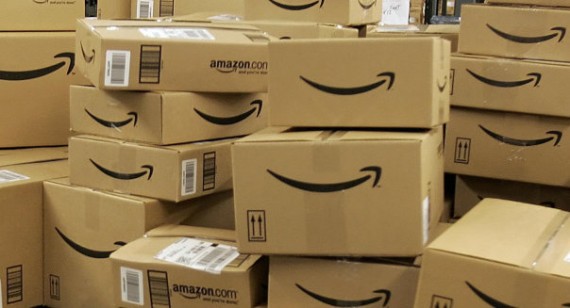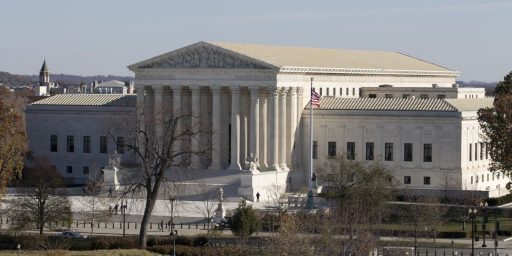Supreme Court Declines To Hear Case Dealing With State Taxation Of Internet Sales
The Supreme Court may have just given a boost to those who want to subject online sales to the same sales taxes as in-person sales.
The Supreme Court declining to hear a case seldom makes national news, and usually doesn’t have a huge impact on national politics or the law, but that may turn out to not be the case when it comes to a New York State case that the Justices announced today they would not accept for appeal. The case involves an effort by New York State to subject sales over the Internet subject to state sales tax in situations where the company making the sales has “affiliates” located inside the state that send referrals to the seller, and the primary party challenging the law was none other than Internet behemoth Amazon:
The Supreme Court on Monday declined to get involved in state efforts to force online retailers such as Amazon.com to collect sales tax from customers even in places where the companies do not have a physical presence.
The issue — ending what for many Americans is tax-free online shopping — is one of the most important in modern retailing. Traditional brick-and-mortar businesses say the online retailers receive an unfair advantage by not collecting sales tax in some areas.
All but five states impose sales taxes, and an increasing number have passed legislation to force online retailers such as Overstock and eBay to begin collecting those taxes from customers.
Online retailers complained that a patchwork of state laws and conflicting lower court decisions needed the Supreme Court’s attention.
“There are billions of dollars of commerce for which we need guidance that we can rely upon,” said David C. Blum, a Chicago tax lawyer who represents both online retailers and traditional businesses. He added: “We have evolved into an Internet world, and we need to know what’s taxable and what’s not.”
As is its custom, the court gave no explanation for turning down petitions from Amazon and Overstock.com to review a decision by New York’s highest court to uphold that state’s 2008 law requiring sales tax collections.
Seattle-based Amazon has no offices, distribution centers or workforce in New York. But the New York Court of Appeals said Amazon’s relationship with third-party affiliates in the state that receive commissions for sending Web traffic its way satisfied the “substantial nexus” necessary to force the company to collect taxes. (Amazon founder Jeffrey P. Bezos also owns The Washington Post.)
It has been 20 years since the Supreme Court ruled in Quill v. North Dakota that a state’s efforts to require tax collections from out-of-state companies violated the Commerce Clause of the Constitution. It said the necessary “substantial nexus” exists when the out-of-state retailer has a “physical presence” in the state.
But that decision came before a revolution in online shopping, and the New York court said the old test may now be outdated.
“An entity may now have a profound impact upon a foreign jurisdiction solely through its virtual projection via the Internet,” the court ruled.
To underscore the judicial conflict over the issue, Illinois’ top court last month struck down its state law, which was modeled after New York’s, but for different legal reasoning.
The ability to make sales without collecting sales tax has been key to the success of Amazon and other online retailers, and the company has been fighting the state efforts one at a time. But as Amazon has embarked on building distribution centers around the country to deliver goods more quickly — establishing the physical presence requirement — it has become subject to more state laws.
As noted, the current law is determined by the Supreme Court’s decision in Quill v. North Dakota, where the Court decided that states may not impose sales taxes on businesses that have no physical presence in the state. The Court did say that Congress could grant states authority to impose sales tax to businesses not present in the state via legislation, though, and in recent years there has been an increasing effort in Congress to get such a bill passed. This year, supporters of a bill authorizing states to impose taxes on Internet sales taxes scored their biggest victory when the Senate passed a bill authorizing such taxes on a bipartisan basis, but the bill has largely languished in the House. Ironically enough, that bill is supported by Amazon along with a whole host of bricks and mortar businesses, with Amazon likely joining the pro-reform side largely because it is increasingly becoming required to charge sales taxes on transactions as it expands its network of Distribution Centers in an effort to upgrade its delivery services. For example, recently Amazon began charging sales tax to Virginia customers shortly after it opened a massive warehouse just outside of Richmond to aid in its distribution efforts. Opposing the bill are other Internet retailers such as eBay, which raises fears that each of the small businesses that use its site to sell products around the country would suddenly become required to calculate and collect sales taxes for the states and local authorities that charge taxes on sales. Theoretically, under the New York State law, eBay affiliates would already be required to do this in New York State assuming their sales met the minimum requirements at which they have to do so.
Obviously, the Courts decision not to accept a case has no legal authority and the appeal that it was presented with was a decision by the New York Court of Appeals, the state’s highest Court, and only applies in New York State. Nonetheless, the fact that the New York State law remains standing and that opponents couldn’t even must four votes on the Supreme Court to agree to hear the case could be impetus for other states to attempt to pass similar laws, thus further chipping away at the Quill decision. The Court’s failure to act may also arguably give some political impetus to Congressional action on this issue, especially if it means placing protections in a national law that would relieve the concerns of smaller businesses. For example, right now the bill pending in Congress provides an exemption to businesses who do less than $1,000,000 per year in business with out-of-state customers. As I’ve suggested before, there is likely some political room for Congress to increase that limit so that small businesses aren’t forced to deal with the administrative headaches and potential liabilities of having to worry about continent wide sales tax laws. Given the fact that this is a law where support crosses party lines, such a change may just be enough to get it through the House, especially in the face of such a strong signal from the Supreme Court that the Judicial Branch isn’t necessary going to be a bulwark against what really seems to be the inevitability of taxation of online sales.







I can understand eBay’s concern since they are really a middleman for thousands of small retailers and the bureaucracy alone might make the model impossible. At one point Amazon was pushing for a uniform sales tax. I don’t really have to worry about that here in Oregon since we don’t have a sales tax.
It is interesting how much of this is caused by the lack of innovation by government. I wouldn’t like it but would go to my state and give them their 10% but I ain’t filling out reams of paperwork listing everything I bought. But they can’t change since so many useless government employees depend on that data for something to mark time with. Sure if I want to claim one of the lower rates for some types of items but otherwise, here’s your cash, now go away.
Of course, they also don’t want the sales tax being an overt transaction as it would raise the tax awareness among the citizens. Such awareness might cause heartburn for the thieving politicians and bureaucrats. Same as withholding. If everyone had to write a check to the treasury every year, or 3 months, then taxes would be a whole lot lower. Probably. Instead many morons think their tax refund is new money instead of simply the government returning the excess cash it took during the year. (excepting of course, those who claim EITC where it is often new money)
@JKB: What this is: SCOTUS is refusing to legislate from the bench and is throwing the whole mess back in Congress’s lap, saying “this is YOUR baby, you figure out how to deal with it.”
If you knew anything about law you’d realize that quite often SCOTUS will do this. They’ll take up a case involving a circuit conflict, write an extremely narrow decision, and make pointed remarks about how Congress should get on the ball. Or they do what they do here, which is refuse to take cases about the issue.
Or there’s the third strategy, which is to keep taking cases on an issue and keep throwing out rules the lower courts may have tried to have created. (e.g. “overly abstract” in patent application cases.)
FWIW, I remember the Sears catalog having a table of state and local sales taxes that had to be consulted on mail orders and failure to do it meant no sale. That Amazon, Ebay, et al, with their legions of programmers can’t handle this seems more about maintaining a price edge.
Reminds me that when I do my state income tax I got ot remember to enter a sum total of my online purchases, look at another table for use tax due, knit one, perl two etc.
@JKB: The government (federal, state, local) are without shame in their greedy money grab from the working class people. Is there not one thing that they will not consider taxable? They need to just let it go. They don’t need a tax on everything. Next it will be extra taxes on tea, paper, windows, sugar. They don’t learn from history.
WHAT??? YOU MEAN THERE IS NO FREE LUNCH???? WHY DO I HAVE TO PAY FOR THE SERVICES I GET???
@Tyrell: And you just plain and simply don’t learn. All that stuff you take for granted? Roads, sewers, water, etc have to be payed for. Schools? Yep, them too. Fire? Police? It ain’t free… Funny how you complain about the state taxing you for all this stuff and it never occurs to you to b!tch about the corporations getting a free ride. Oh… wait a minute… those corporations are over taxed according to you. We HAVE to give them tax breaks so they can create jobs (heavy sarcasm) for us peons. Which means…. You are in favor of paying higher taxes.
Riiiggghhhtttt????
@OzarkHillbilly: Right. (overflowing with sarcasm)(watch where you step)
But, why should they? There’s no reason why navigating the state and local sales tax laws cannot be a service provided by a private corporation, which the small businesses can contract with.
Visa could do it in a heartbeat. (Or MasterCard, to make retailers favor MasterCard), Amazon did it when they ran Target.com, and continue to do so for their third party merchants.
@Tyrell:
Uhh, those are already taxed, chief. When’s the last time you bought a notebook or a new windowpane?
If it’s produced here or brought here, it exists here under some form of government protection or largesse (such as transportation infrastructure). It therefore is subject to tax.
We need better people here to present the Republican/Libertarian point of view. Someone who can explain exactly why it is fair that out of state retailers are, by law, given a significant competitive advantage over in-state ones.
I think a lot of small online retailers would quit doing business or limit business to one state.
Amazon is huge and can afford to pay somebody else to do the paperwork, but a small shop that specializes in a few things probably can’t.
I think the easiest way to handle this is to impose one tax for every state (yes it might come in lower or higher but if each state wants a cut). Generally I think the best way would be to charge the sales taxes in the state the business is located in (or course this might result in some retailers fleeing high sales tax states for no sales tax states).
@walt moffett: Sears has a physical presence — and thus a Tax License — in every state. For Amazon it’s more than just a matter of calculating percentages — there’s the army of accountants required to keep up with each state’s laws. This is, frankly, rediculous when there’s no presence in the state.
The real problem is the “bully problem*”: if I’m a small business, then I can’t afford to take the State of New York (the Bully, proven many times over) to court. The best I could do is have my Lawyer write a letter informing them that, as I have no presence in New York they have no jurisdiction.
Can I really afford it when they (inevitably) take it to Federal Court to “bully” me into submission?
* – C.F Mayor Bloomberg.
If ever there was an argument for a flat rate national sales tax for out-of-state purchases, this is it….
Take a look at Illinois sales taxes if you want to be totally discombobulated. About the only thing more impossible to calculate are our local real estate taxes, which depend on where you live, how expensive everyone else in the same block is, how much $$$ the local region wants to raise, what classification you fall in, and oh, probably the phase of the moon. Luckily we only have to calculate them once every three years….
@John D’Geek:
And yet the Sears,the mail order giant of the day, found it could employ an army of accountants to so that insert in the catalog was up to date. That Amazon, et al, can’t ring up say the Tax Foundation to get a up to date list and program accordingly is more a reflection their business practices. As to the bully/Eliot Spitzer factor, you have a point, but that applies to any of us 99% when the tax man comes.
Unquestionably believe that which you said. Your favorite
reason seemed to be on the internet the simplest thing to be aware of.
I say to you, I certainly get annoyed while people consider worries that they just
do not know about. You managed to hit the nail upon
the top and also defined out the whole thing without having side
effect , people can take a signal. Will probably be back to
get more. Thanks
States that impose sales tax do so through laws enacted by duly elected legislatures. They aren’t vestiges of colonial rule. Residents who don’t like the tax laws in their states are free to lobby, vote or protest to change them.
Furthermore, if Amazon wants to do business in NY it should abide by NY law, same as Macy’s or any other retailer with a physical presence. On line retailers already have a lower overhead advantage. Why should they be exempt from doing what every business located in a state is required to do? If you want NY customers obey it’s laws. Otherwise don’t sell there.
And last, why would NY share any of its revenue with others? Write your own laws, tax your own residents, collect you own revenue and spend it as you please. The notion that Internet sales should be different from store sales is absurd. It is the item or goods bought that is subject to tax. Not its venue or location.
@ JKB
Damn straight. Yet if you listened to liberals, you would think the government was the one that got the internet started. How stupid can you get? Everyone knows John Galt invented the internet.